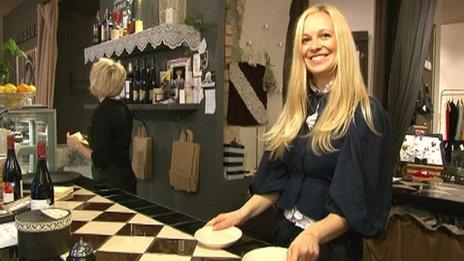Latvian lessons for Greek tragedy
- Published

Greta Gorjucko opened her cafe in the midst of some of the harshest spending cuts in Europe
When Greta Gorjucko lost her job in television and decided to open a cafe last year, at the height of the economic crisis, her friends thought she was mad.
After all, Latvia was one of the countries hardest hit by the financial crisis, seeing its economy shrink by a quarter over two years. And unemployment had reached almost 23%, the highest in Europe.
But with its stripped down walls, vintage furniture and bohemian clientele, Bonera is just one of many hip cafes that have sprung up in the centre of Riga.
Not what you'd expect of a country going through a major austerity drive.
Ms Gorjucko says that it is thanks to the crisis, and the subsequent austerity measures, that she was able to open her business at all - something she could never have done during the boom years of double-digit growth before 2008.
"It would have been impossible to survive, because the rents were high, the salaries were high, and we would have had to close after the first or second month."
Today, she says, lower commercial rents mean things are much easier for small businesses. "Actually, a lot of good places have opened in the crisis period with not a lot of money," Ms Gorjucko said.
Austerity cuts
The driving force behind the austerity is Prime Minister Valdis Dombrovskis, who took over in 2009 after the previous government collapsed at the height of the crisis.

The prime minister has won two elections, despite the tough measures, and the economy is growing
Straightaway he embarked on the toughest budget cuts in Europe: ministries were cut by a third, the number of government-run agencies was halved, and public sector wages were slashed by an average of 25%. Some teachers even saw their wages fall by 70%.
At the time, the measures were controversial. Some economists accused Mr Dombrovskis of strangling the economy, destroying any chance of future growth.
But the prime minister told the BBC that Latvia's economy is now growing again, thanks to those harsh budget cuts.
Financial stability is a prerequisite for growth, he says.
"Often there is the argument heard from the eurozone crisis that it's not a good idea during the recession to raise taxes or to cut expenditure, that it only makes the recession worse, so let's wait until the economy stabilises and let's do the adjustment then," Mr Dombrovskis says.
"Unfortunately this logic does not work because if you are already having financial problems, financial markets will not calm down and you will not come to a stabilisation of the economy."
'End of tunnel'
Mr Dombrovskis predicts growth of up to 5% this year. Exports have grown by 30% and industrial production has increased by around 14%.
He believes the key is to push through austerity measures quickly and do the most painful cuts straightaway.
"You convince the financial markets that you are serious about the adjustment and you restore financial stability," he explains. "It's important for people to see light at the end of the tunnel."
"Once this adjustment is done, people can adjust to the new situation. And at least they know what to expect and they are not worrying that there is still worse to come."
The measures were not popular.
But there was only one major demonstration - very different to the situation in Greece, where protests have at times been daily.
A political scientist at the University of Latvia, Daunis Auers, says that this stoicism is partly a result of the country's traumatic past: many Latvians remember a time when the economic situation was far worse, after the collapse of the Soviet Union in 1991.
"Twenty years ago, inflation was rising rapidly and by 1992, it was almost 1,000%. Salaries in the public sector weren't being paid for months at a time, and the benefits were small to non-existent."
"This clearly isn't the case with Greece where people have grown to rely on the state. They've had steady economic growth since the 1970s. And when all of a sudden the state lets them down, they go out onto the streets. Latvians don't expect anything from the state."
But the human cost of the budget cuts is clear.
Low government spending has kept unemployment high, at over 16%, which is more than in Greece. And even those still in work say that wages are often too low to survive on.
"Over the last two years, 200,000 people have left the country, and a lot of households remain deeply in debt, unable to pay," says economist Alf Vanags. "Huge numbers of people are at risk of poverty when they otherwise wouldn't have been."

Latvians at market get on with everyday life
"Latvia has virtually no effective trade unions, so there's really no political resistance to the measures here. It's very different to Greece, Spain and Portugal where there are strong unions. So you really can't do the same thing."
The main lesson, says Mr Auers, for Greece and other countries now being forced down the path of austerity is fairness.
"In Latvia, everybody was affected. It wasn't just low-ranking public servants. It was also the prime minister. Everybody had their salaries cut and the government moved from fancier offices. When society sees that everybody is chipping in, it makes it much more palatable."
Causes for concern
There are worries that economic problems in the eurozone could drag Latvia back into recession. Many predictions for growth this year are now much lower than the government's 5% figure.
And some economists question the wisdom of keeping the Latvian currency pegged to the euro at all costs. This is a key policy objective of the current government, in order to join the European single currency in 2014.
But it means the option of devaluation is ruled out. And there are now questions about the value of joining a currency in crisis.
Remarkably, Mr Dombrovskis has survived politically. He's won two elections, seeing off opposition politicians with populist pledges to end austerity.
His training as an economist has helped win trust with the electorate. And his matter-of-fact, and often uncharismatic, style is seen as refreshingly honest by Latvian voters who have had enough of the flashy and corrupt oligarchs of the past.
It seems the electorate sometimes appreciates the harsh truth over unrealistic promises.
- Published27 November 2012
- Published27 October 2011